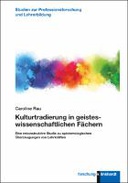Explore

Kulturtradierung in geisteswissenschaftlichen Fächern
Caroline Rau
2020
0 Ungluers have
Faved this Work
Login to Fave
This study examines the epistemological beliefs of humanities teachers. It aims to describe how they construct knowledge in the humanities and to identify associated forms of cultural transmissions. How do teachers deal with cultural manifestations such as poems or images in their teaching practice? How is their meaning elaborated? Which meanings are given? The methodology of the study is based on the qualitative-reconstructive research paradigm: The data were collected by group discussions and analysed using the documentary method. The epistemological beliefs of humanities teachers show that teacher transmit culture as high culture. They understand a cultural canon in dimension of the nation state. Teachers tend to limit the significance and the potential meaning of cultural content in school practice by introducing into a today problematic cultural essentialism. In reconstructing their epistemological beliefs, it also became obvious that these beliefs affect the reception of culture: The reproduction of traditional cultural content or its meaning is the focus. Students are denied the opportunity to influence culture(s) and, if necessary, to transform culture by cultural production. The study contributes to empirical education research, to subject didactics in the humanities and to the foundations in education. This study has opened up new perspectives on a subject that has previously been the topic of relatively little research, thus making a valuable contribution to basic research in teaching of the humanities. (DIPF/Orig.)
This book is included in DOAB.
Why read this book? Have your say.
You must be logged in to comment.
Rights Information
Are you the author or publisher of this work? If so, you can claim it as yours by registering as an Unglue.it rights holder.Downloads
This work has been downloaded 138 times via unglue.it ebook links.
- 138 - pdf (CC BY-NC-SA) at OAPEN Library.
Keywords
- Bayern
- Conception of science
- Cultural Education
- Culture
- Deutschland
- Dokumentarische Methode
- Education
- Educational psychology
- empirical research
- empirische Forschung
- Epistemology
- Erkenntnistheorie
- Fachdidaktik
- Geisteswissenschaftliche Pädagogik
- Geisteswissenschaftlicher Unterricht
- German academic secondary school
- Germany
- Grammar School
- Group discussion
- Gruppendiskussion
- Gymnasium
- History of Education
- Humanistic pedagogics
- Humanities instruction
- Intermediate school
- Kulturelle Bildung
- Kulturvermittlung
- Lehrer
- Lehrerbildung
- Lower Saxony
- Method
- Methode
- Niedersachsen
- Philosophy & theory of education
- Professionalism
- Professionalität
- Professionality
- Qualitative Forschung
- Qualitative research
- Realschule
- School
- Schule
- secondary school
- Society & Social Sciences
- Specialized didactics
- studie
- subject didactics
- Teacher
- Teacher Education
- Teachers' training
- Teaching
- teaching practice
- thema EDItEUR::J Society and Social Sciences::JN Education::JNA Philosophy and theory of education
- thema EDItEUR::J Society and Social Sciences::JN Education::JNB History of education
- thema EDItEUR::J Society and Social Sciences::JN Education::JNC Educational psychology
- unterricht
- Unterrichtspraxis
- Vorstellung <Psy>
- Wissenschaftsverständnis
- Wissensvermittlung
Links
DOI: 10.35468/5811Editions

